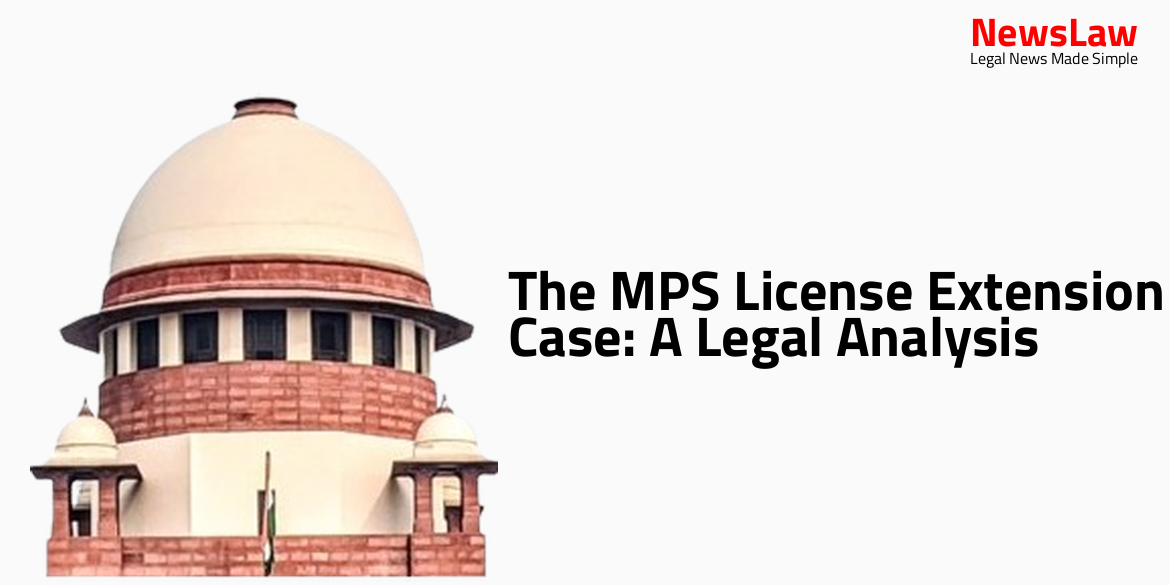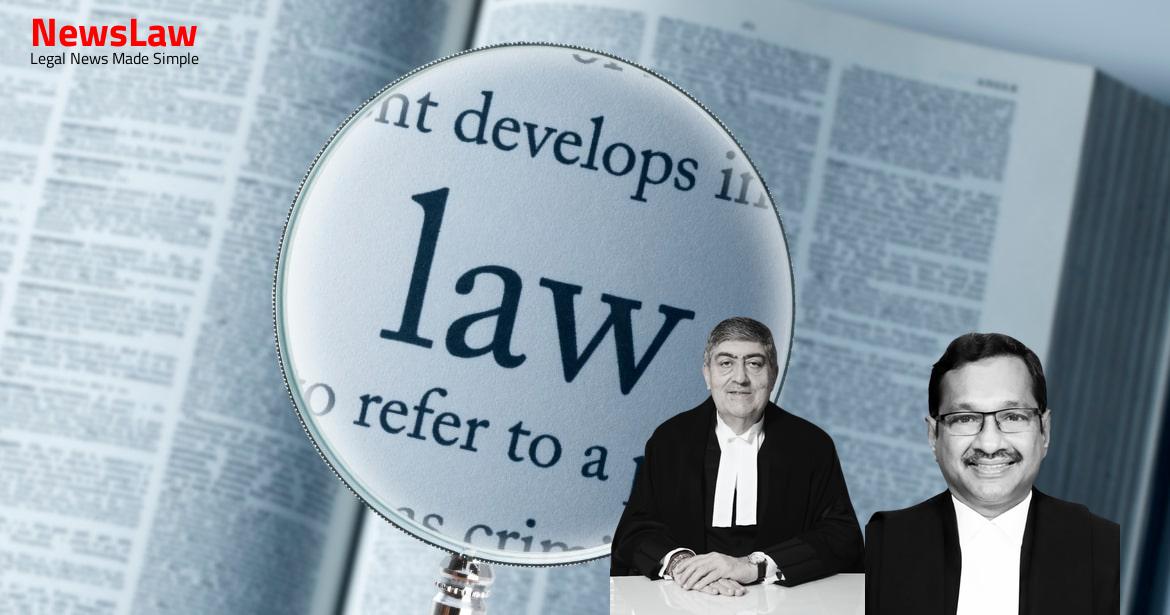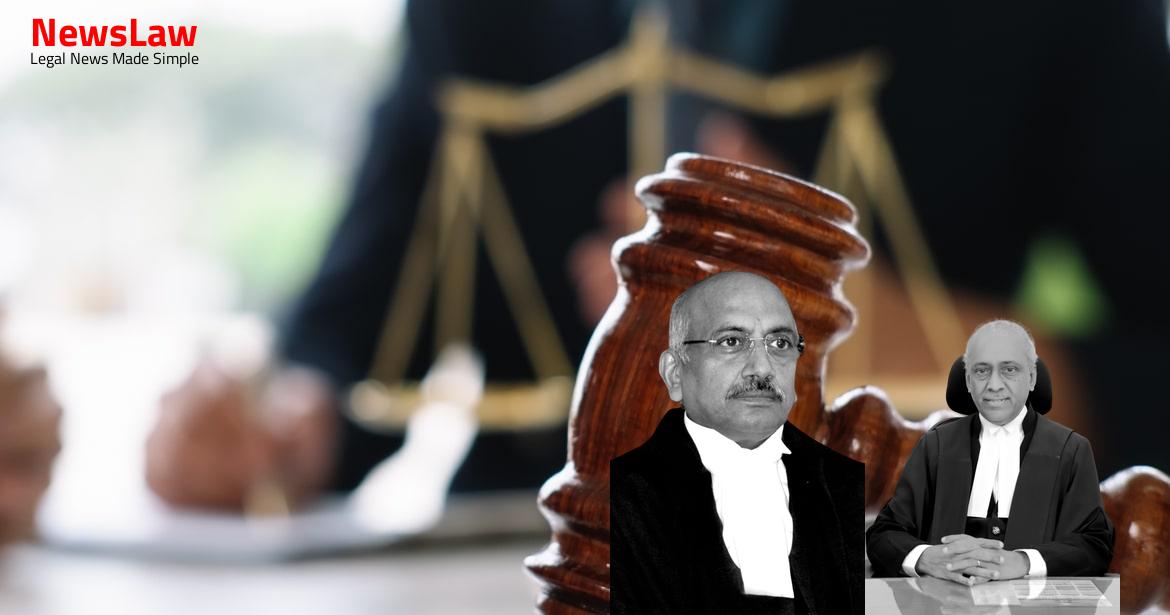Exploring the legal complexities of the MPS license extension case decided by the Delhi High Court. This case involves the extension of licenses for MPS operators at various railway stations, including Petitioner 1 operating at Bareilly Railway Station and Petitioner 3 at Haridwar Railway Station. The court’s judgment addresses the extension granted by Respondent No. 2 due to force majeure events and related policy implications. Stay informed about the key findings and legal arguments presented in this crucial case.
Facts
- The tenure of licenses for the petitioners was initially until 21.12.2022 as per the Master License Agreements.
- Due to Covid-19 lockdown being a force majeure event, the tenure was extended until 27.02.2023 through letters dated 14.12.2022 from Respondent No.2.
- The agreement explicitly states no extension or renewal, yet the extension was granted due to the lockdown.
- Petitioner 2 and Respondent No.2 entered into a Master License Agreement on 29.10.2021.
- Petitioner 3 and Respondent No.2 entered into a Master License Agreement on 17.08.2020.
- The petitioners were instructed to vacate their MPS by 27.02.2023 in the letters sent to them.
- Petitioner 1 operates three MPS at Bareilly Railway Station, Petitioner 2 operates one MPS at Moradabad Railway Station, and Petitioner 3 operates one MPS at Haridwar Railway Station.
- The conversion of stalls/trolleys to MPS was enforced upon the petitioners by Northern Railway in 2017 under the Commercial Circular No. 61 of 2017 (‘2017 Policy’).
- Various Master License Agreements were signed between the petitioners and Respondent No.2 confirming the license arrangement, with dates ranging from 31.03.2021 to 29.10.2021.
Arguments
- Petitioners argue that the extension of the contract due to Covid-19 is arbitrary, especially when compared to other MPS units in different railway zones.
- They point out that foot traffic at railway stations significantly decreased post-lockdown, leading to a reduction in license fees from June 2020 to March 2022.
- Petitioners seek an extension of the license period proportional to the reduced fees.
- They rely on various legal decisions to support their argument.
- Petitioners challenge Clause 5 of the 2017 Policy as it denies the right to license renewal and forces existing licensees to compete against larger companies.
- They request the issuance of a writ of mandamus to compel the authorities to renew and extend their licenses.
- Petitioners’ licenses have expired, and they believe they have the right to have them extended.
- They argue that the 2017 Policy is arbitrary and discriminatory towards them.
- Petitioners highlight that in a similar case, a challenge against the 2017 Policy was dismissed by the Karnataka High Court.
- They distinguish their case from South Central Railways as their licenses are governed by the 2017 Policy.
- Petitioners mention that they were never prompted to participate in tender processes or submit renewal applications before the policy change.
- They claim a legitimate expectation to sustain their business operations and renew their licenses.
- Petitioners seek the renewal of their licenses based on the Supreme Court judgment in South Central Railways.
- They perceive the refusal to renew their licenses as arbitrary and a violation of their fundamental rights.
- Petitioners assert that they converted their stalls under duress and unequal bargaining power.
- They argue that the 2017 Policy does not allow for renewal after the completion period.
- Petitioners claim that the new policy is beneficial to them and they were aware of the conditions when they converted their stalls.
- They mention that licenses for reserved categories undergo a different process than those for the general category.
- Petitioners argue against the jurisdiction of the court based on clauses in the license agreements and arbitration in the 2017 Policy.
- Petitioner signed a contract for a non-renewable five-year period and enjoyed its benefits.
- The contract was not under the Catering Policy but a different policy.
- The judgment cited by the petitioner was regarding the Catering Policy and not applicable to their case.
- The petitioner cannot go back and claim a different policy after the contract’s completion.
- The attempt to take advantage by seeking application under previous policies was rejected by the court.
Analysis
- The judgment discusses the reservation provision of 33% sub quota for women in allotment of each reserved category of MPS at all stations.
- Clause 9 of the 2017 Policy provides for reservation in allotment for marginalized sections of society.
- The appellants do not have an indefeasible right of renewal under the Easements Act or the policy.
- The petitioners voluntarily converted their stalls/trolleys to MPS based on letters from the Railway Board.
- A Force Majeure clause was implemented for all non-operational catering and vending contracts due to lockdown.
- The petitioners did not challenge the letter dated 21.05.2020 from the Railway Board.
- The 2017 Policy safeguards the rights of marginalized minorities and weaker sections of society.
- There is no transfer of interest in the property in favor of the grantee under the policy.
- Granting a license in perpetuity would be against the constitutional principle of equality of opportunity.
- A writ of mandamus cannot be issued under Article 226 for framing policy in a particular manner.
- The petitioners’ claim of ‘legitimate expectation’ for license renewal lacks merit.
- The 2017 Policy explicitly states no extension or renewal of MPS units, but allows participation in fresh bids.
- Law does not permit a permanent right to seek extension/renewal of licenses.
- The challenge to Clause 5 and 11 of the 2017 Policy is deemed unsustainable based on the facts presented.
- The licenses of the petitioners were extended for a specific period due to Force Majeure events.
- The extension of license period for petitioners post-Covid-19 lockdown was not arbitrary.
- A license is revocable at the will of the grantor, as defined under law.
- The specific part of the judgment focuses on point 55.
- The judgment outlines the details mentioned in point 55 of the case.
- Point 55 of the judgment discusses a crucial aspect of the case.
- This section delves into the specifics of point 55 from the judgment.
- The courts have the jurisdiction to declare a law as unconstitutional.
- The Karnataka High Court in the judgment dated 19.02.2024 in the case of Gulfeeza Begum v. Union of India rejected a challenge to the 2017 Policy, stating that breach or threat to breach a fundamental, statutory, or enforceable equitable right is necessary for the issuance of a writ of Mandamus.
- The court cannot delve into the intricacies of individual situations at railway stations when the basis for working out the dies non period has been disclosed by the respondents.
- Judicial review of a policy decision and issuing a mandamus to frame policy in a specific manner are distinct concepts.
- A legitimate expectation does not always entitle the expectant to relief as public interest, change in policy, or valid reasons given by the decision-maker may negate the legitimate expectation.
- No public body under the constitutional system is vested with arbitrary powers, as highlighted in the case of Ramana Dayaram Shetty v. International Airport Authority of India.
- Merely because relaxation was granted in the past as a matter of policy, it does not entitle individuals to claim assistance or mandamus for a similar relaxation in the future.
- A writ of Mandamus cannot be issued to direct authorities to enact laws or frame rules, it is primarily for enforcement of fundamental or statutory rights.
- The individual license agreements and the 2017 Policy contain an arbitration clause for grievances related to insufficient extension due to Covid-19 or for claiming damages.
- Petitioners are allowed to invoke the arbitration clause and initiate appropriate proceedings if aggrieved.
- This clause is applicable to licensees who have not yet formally executed the license agreement.
Decision
- Existing stalls/trolleys have the option to convert to MPS or continue till agreement expiry.
- Petitioners opted to convert their stalls to MPS for 5-year tenure.
- Space will be standardized and allotted for new MPS after current agreements expire.
- Existing stalls can convert to MPS by paying license fee for 5-year tenure.
- Petitioners in this batch of petitions opted to convert stalls to MPS.
- Court deems petitions maintainable and adjudicates on merits.
- Existing stalls can convert to MPS by paying quoted license fee for 5-year tenure.
- Petitioners seek conversion of stalls to MPS and agree to pay revised fees.
- Petitions are dismissed, but petitioners granted 3 months to vacate stalls for transition.
Case Title: RAJIV RANJAN RAI & ORS. Vs. UNION OF INDIA & ORS. (2024:DHC:4452)
Case Number: W.P.(C)-16544/2023



